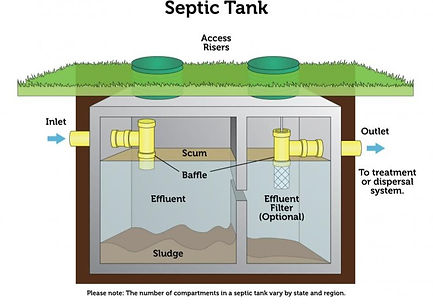

You have questions? We have answers!



How does a septic system work?
Every time you run the sink, take a shower, do a load of laundry, or flush the toilet, everything that went down the drain runs into the septic tank. Any solids, whether they are food remnants, human waste, or toy cars, settle at the bottom of the tank and form a layer of sludge. The bacteria that occurs naturally in the tank helps break down much, but not all, of this. The liquid layer fills the tank rather quickly (days to weeks depending on usage) and it flows out into the drain field where the pipes distribute it evenly into the ground below to continue its natural process of being broken down by bacteria and filtered through rock and sand back into the earth.
How often should I have my tank pumped out?
The EPA recommends every 3-5 years. It's a relatively inexpensive way to prevent backups and extend the life of your drain field. As the years go by, the sludge layer builds up and needs to be pumped out. If it comes up too high, it can back up into the house or make its way toward the drain field where it can clog pipes or compromise the field itself.
How can I extend the life of my system?
* Use septic safe toilet paper. Swirl a few sheets of toilet paper in a bowl of water and see how long it takes to disintegrate. Some paper hardly breaks up at all.
* Don't use "flushable" wipes. Ask any toddler, there is a never ending supply of things in your home that are technically flushable. Not all are biodegradable.
* Don't use your toilet as a wastebasket. Septic tanks make for an expensive trash can.
* Keep solvents and other harsh chemicals out of the system . They disturb the natural bacteria that keeps
everything functioning correctly.
* Try to space out water usage to not overwhelm the drain field. If you can, don't do all the laundry on the same day. Try not to take long back to back showers. Today's modern appliances use much less water than in the past, but it can still make a difference. A washing machine can use anywhere from 14 to 45 gallons of water per load depending on size, type and efficiency level.
* Avoid using a garbage disposal and don't put grease down the sink.
* Don't plant trees near the system. The roots can infiltrate the tank and drain field, taking years off their lifespan.
* Never park vehicles on the tank or drain field.
* Make sure downspouts lead away from the drain field.
* Don't install sprinkler systems over the drain field. The lawn there should get plenty of water.
* All systems installed after 1998, and some installed earlier, have a filter to help keep solids from reaching the drain field. This filter should be taken out and cleaned every year.
How do I know if there's a problem?
* Drains in the house get slow or gurgle
* Noticeable depressions in the yard
* The drain field gets soft, mushy, or smelly
Why is my alarm going off?
Mound systems are used when you need to manufacture more distance between the water table and the drain field. A pump is used when you have to work against gravity. If the alarm is going off, it means that water in the pump chamber is too high. The system should have a dedicated circuit breaker. See if that has been tripped. The outlet for the pump should be a GFCI. Check and see if that needs to be reset. Another common culprit is a mishap with a lawnmower or weed wacker. Look around for a severed wire. If none of these answer the question, please call us and we'll send a technician out.








